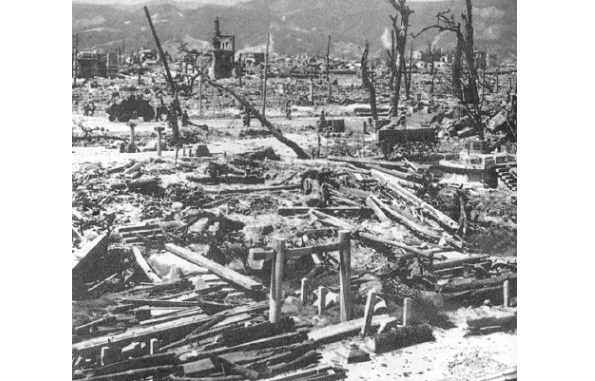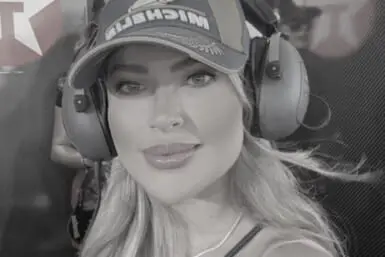by Robbie Walker
Erin was determined to do a good job, especially since she had volunteered to do this extra credit report for her 8th grade social studies class. Unlike most of her classmates, she loved history. It was the one place she could keep asking ” why ” without the teacher getting all frustrated and upset.
Erin really didn’t understand why so many evil things were done throughout time, but she hoped one day the pieces of the puzzle would come together. In the meantime, she needed to write this report on the Hiroshima bomb. With a flash of sudden insight, she thought of her grandfathers. Swiveling her chair to face the computer screen, she typed a couple of e-mails.
The veteran read her letter with a heavy heart. It was not the first time he had been asked to share his experiences in the Pacific, but the way the questions were worded in this missive made him believe his granddaughter was asking for more than a straight-forward telling of events. Those were gruesome enough, and his retelling had never before gone beyond facts and eyewitness accounts, both strictly contained within the parameters of what was known at the time.
Even if he wanted to elaborate, to share with her something of what it had been like when he was only 23 years old, he wasn’t sure he could find the proper words to do so.
Since his hometown was San Diego, joining the Naval Reserves during senior year in high school was not an unusual occurrence. Besides, everyone knew war was coming. But the veteran’s war years were destined to be different from most others. Sitting for the fleet-wide examination open to all enlistees, he placed third in the competition and ended up in Annapolis at the U.S. Naval Academy instead of on a warship for the next few years.
The Academy condensed four years of schooling and military training into three, demanded that all participants learn Japanese, and then shipped everyone out to the Pacific upon graduation in June of ’45. He himself was on a destroyer headed to Japan when the bomb was dropped.
The veteran wondered how to explain all this to his granddaughter. Would she understand how ordinary sailors and soldiers accepted orders without question, when she had been raised to question everything? Would she accept the explanation that our President acted rightly as a Commander-in-Chief should, protecting all those he had sworn to protect, when he made the decision to drop the bomb?
Hastening the end of a horrible war meant horrible suffering, but the veteran believed that when Truman decided to drop the bomb, the President understood he was trading Japanese lives for American lives.
After Japan’s surrender, the veteran spent several years in that country as part of the U.S. Occupation forces. Because of his education and language skills, he had been one of the few allowed to travel outside proscribed military circles. He had seen the end results of the war, and had had to reconcile that with the fear he had felt on that destroyer headed to Japan for an invasion.
Sometimes, he knew, leaders had to make decisions, and God protect us all from the wrong choice. Can a young girl understand any of this? How do I tell her?
Carefully choosing his words, the veteran replied to his granddaughter.
“Dear Erin:
“I was a naval officer on a destroyer off Okinawa at the time of the Hiroshima atomic bombing. When we heard the news, we all had very mixed emotions. The thought of the devastating deaths and destruction at an unheard of level was overwhelming and deeply saddening. But, then, we thought militarily, as we were trained to do. We were preparing to hunch an invasion of Japan that would surely result in the deaths and maiming of civilians.
“To say nothing of the cities, towns, factories, farms, homes, ships and airplanes that would be destroyed on land and sea and throughout Japan. President Truman had an awful scale to balance in making the decision to send Enola Gay on its way. With deep sorrow for those who suffered and died, I must say that his momentous decision, which hastened the end of that awful war, was justified.
“With love,
“Grandpa Guv”
The second gentleman who received Erin’s e-mail was a retired engineer. Unlike the veteran, he had never replied to previous requests for information about the Pacific War. Granted, he hadn’t received many, only from some of the older grandchildren, but he had not felt the need or desire to respond about that horrible time. He also had never served in the Armed Forces.
His engineering degree and job at a steel mill in Japan, where he was living when the war between his two countries broke out, kept him from being drafted by the Japanese Imperial government. And while he assumed the Americans did not draft Japanese-Americans, he doubted a draft notice, even if sent to him, would ever have found its way to his home at the time, on Kyushu, Japan’s southernmost main island.
The engineer tried to force his mind away from thoughts of America in the early ’40s. He was, perhaps, still bitter about the way the U.S. government had taken away what two generations of his family had built in Stockton. His parents had lost their hotel and their home, made to believe their three American-born children would be safer living in Japan, so sent them there, and then were forced to live behind barbed wire in an internment camp in Arkansas, of all places.
Why, then, was he considering this request for information about the atomic bomb? The gentleman mentally shrugged. All he could figure was that he was getting old, and that old men liked to pass on their stories. It was time he broke his silence.
He wouldn’t tell his granddaughter much; he couldn’t quite go the whole distance, maybe never would be able to, but he could give her a glimpse. Maybe she could sort it out, or understand why it happened the way it did.
“Dear Erin:
“My grandparents, Kiyotaro and Hana, were among the first Japanese immigrants to Hawaii, with Kiyotaro signing on as a contract laborer. He dynamited land to build roads that are still in use today. From Hawaii, the family moved to California, and established a successful business, which in due course was left in the hands of their son, my father.
“Kiyotaro and Hana, along with their youngest daughter Matsuko, moved back to Japan upon retirement and built a home on property they owned in the western part of the city of Hiroshima.
“Hiroshima was often called the ‘Venice of Japan.’ Built on a delta of the Ota River— seven rivers pour into Hiroshima Bay—on the northern shores of the Inland Sea. The mountains surrounding the city on all other sides add to its appearance of isolation from the rest of the main island.
“But appearances deceive and, by the early 1940s, Hiroshima, the capital of Hiroshima Prefecture, had a population of about 350,000 and was an industrial capital, devoted to ship making, automobiles and armaments. It was also the headquarters of the 5th Army Division, and the Ujina seaport of the city was used as an embarkation point for military forces and as a supply depot for overseas expeditionary forces.
“My grandparents’ home, like their neighbors’, was modest. A two-story wooden structure with a tile roof, total floor space was not much more than 300 square meters. Still, the back yard was dedicated to a beautiful Japanese garden, complete with a small pond stocked with golden carp; the pine and maple trees in the front yard were well aired for and trimmed to perfection.
“Matsuko had a job at the tax office, and her mother fixed her a lunch every day, which she carried to work in a small metal lunch box.
“Near the end of the war, U.S. planes started carpet-bombing all of the major Japanese cities, using incendiary bombs. In the early morning of Aug. 6, 1945, an air raid alarm was broadcast in Hiroshima; radar showed a blip of some planes over the southern tip of Kyushu that seemed to be coming to Hiroshima. After a while, a couple of B-29 bombers were sighted above the city, but they just flew away. An all-clear signal was given. Then, about 8:15 a.m. a lone bomber was sighted above Hiroshima. At this time, many were working hard to demolish houses so as to create a firewall, which would minimize the spread of fire in case incendiary bombs were dropped.
“They saw this lone bomber and wondered what it could be. Fortunately, many children had been relocated out to the country. When the bomb was about 500 meters from the ground, there was a streak of blue lightning flash, and a second later a big blast sounded. The local term for lightning streak is pika and the sound of the blast is don, so from then on, in Hiroshima, they called the atomic bombing ‘PIKADON.’
“At the time of pikadon, my grandparents were in their home. They told me the house shook and then leaned out about a meter. The windows and doors were all blasted away, but the main structure stood solid, and they survived with but a few scratches. Matsuko was already at her office at the time of the bombing. When the fifth day passed without her coming home, her father went in search. The tax office building was no longer there; scavenging among the rubble, he found a lunch box with her name on it. I still have that lunch box.
“My grandfather also told me of seeing those near the city center who had survived, walking dazed and naked, with radiation-burnt skin dangling from their bodies like rags.
“He said he heard many dove into the river to ease their pain, but drowned.
“My younger sister, who had been sent from America to Japan for safe-keeping and so she would not have to endure the horrors of the internment camp, was also living and working in Hiroshima at that time. Her job was with the Toyo Can Making Co. plant near our grandparents’ home. On the day of the bomb, she had been told to report to their other company office located in a cave dug out on the side of the mountain in the western end of the city, and she dutifully left at dawn to get to the other office at the start of the workday.
“So it was sheer luck that she was away on the day of the bomb. And she is the one who told me what happened, and begged me to come to Hiroshima to help the family. I could not go immediately, but I was able to send your grandmother, Kimiko, who was four months pregnant with our first child. Her family also lived in Hiroshima.
“The scant reports we heard told of an unusual bombing raid and both of us wanted to go and help our loved ones. It wasn’t until after the Emperor announced on Aug. 15 that Japan had surrendered and war was over that I was able to leave for Hiroshima.
“Walking from the train station to my grandfather’s home, I saw a half-naked red-colored man sitting on the street and found that he had coated his skin with tincture of Mercurochrome to relieve his pain and prevent infection. It was a miserable sight.
“Kimiko and I did not have the time to see the city, as we were very busy repairing the home, and making it livable for the family. So I cannot give any account of the situation within the city at that time. Kimiko miscarried our baby while we were working so hard to repair the home.
“Love,
“Ji-chan”
After much thought and re-reading of her grandfathers’ e-mails, Erin wrote her report.
“On Aug. 6,1945, an atomic bomb was dropped on Hiroshima City in Japan. The bomb exploded at a height of about 580 meters. All wooden houses within a two-kilometer radius were completely burned down. The only buildings left standing were concrete and brick structures, and these were gutted. Seventy-eight thousand people were killed and about 37,000 were injured.
“If that bomb had not been dropped, I might not be here giving you this report. One of my grandfathers was on an American destroyer that was headed to Japan as part of an invasion to end World War II, and he could have been killed in such an invasion. But grandpa says the atomic bomb ended the Pacific War, so it is impossible to guess what would have happened otherwise.
“My other grandfather tells me about my family killed by that same bomb, of how my dad’s older brother or sister died before being born because of the radiation hurting my grandmother, and of an aunt whose lunch box is our only remembrance of her.
“Here is what my grandfathers wrote me. Please tell me if you understand.”









